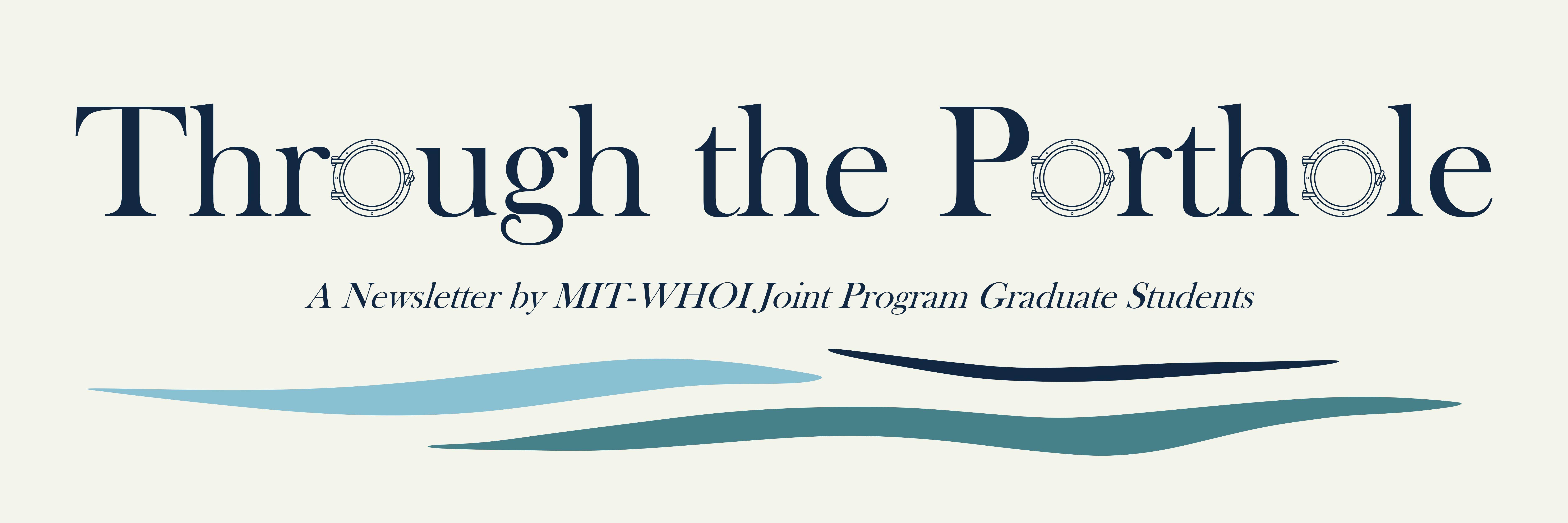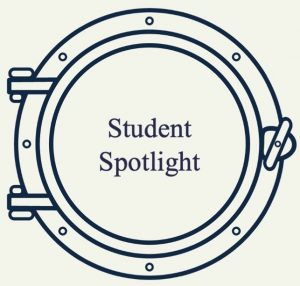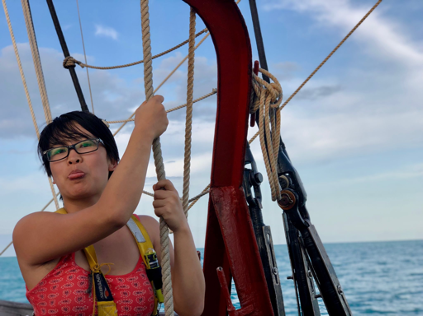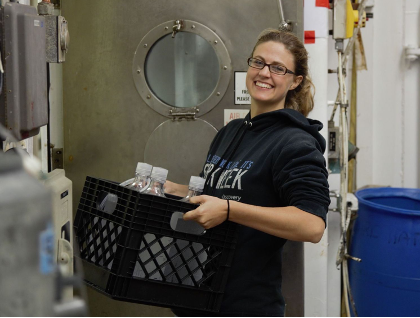

Student Spotlight: Lei Ma & Lydia Babcock-Adams
Students in the Joint Program come from a variety of backgrounds: from microbiology, to physics, to mechanical engineering, to marine science. The ocean itself encompasses a huge number of scientific fields; those who study it cross the bounds of scientific disciplines to describe the poetically indescribable: the ever-changing ocean. Students from all walks of science and engineering offer valuable skills that they can use to explore and discover the intricacies of the marine world.
This month we highlight the experiences of two students, Lei Ma (whose words will appear on the left, in dark blue) and Lydia Babcock-Adams (whose words will appear on the right, in teal), who came into graduate school with very different familiarity with ocean sciences. Both students highlight the skills and strengths they brought to the Joint Program from their undergrad, and how they’ve felt their undergraduate education prepared them for a Ph.D. in marine sciences.


Introduce yourself! What do you study in the Joint Program?
My name is Lei, I use she/her pronouns, and I study marine microbes in Amy Apprill’s lab. My current projects involve looking at coral reef-associated seawater microbes, as well as microbes inside corals, and inside brackish-water fish called “killifish”. One main goal of my research is to understand how the microbial community composition affects the biology of their environment. For microbes in seawater on coral reefs, I’m investigating whether or not they are specialized to a particular reef or reef system.
Hello! I’m Lydia Babcock-Adams, I use she/her pronouns, and I’m a fifth year in the Marine Chemistry & Geochemistry program, working with Dan Repeta. I study organically bound copper in seawater: looking at the concentrations of those compounds, distributions in the oceans, and trying to elucidate the structure of those compounds.
What did you study in undergrad? Was it similar, or different to what you study now?
In college I was really focused on microbial ecology as well. I went to Brown University for undergrad, majoring in Biology, and I took a lot of microbiology classes. I did some research with the plant Arabidopsis, and the interaction of plant genotype and soil microbes. I don't think even knew much about WHOI during undergrad, except that I knew one person in my residence who was thinking of applying. When I was applying to graduate programs…I was just looking for strong microbial ecology programs. And WHOI has great microbial ecology, but you don't know that unless you know the researchers doing that work; if you don't know about oceanography, you might just assume it's all about fish.
In undergrad I double majored in Chemistry and Marine Sciences, with an emphasis in marine chemistry. While my undergrad senior thesis was about photochemistry in the ocean, which isn’t what I study now, I was in a combined-degree program at the University of Georgia that allowed me to get my Master’s at the same time I was getting my Bachelor’s, and my Master’s work was in the field of marine organic geochemistry. The techniques I used during my Master’s were really similar to what I’ve used in my Ph.D. in the MIT-WHOI Joint Program, things like connecting chromatography to mass spectrometry to look at organic compounds.
Did you have prior experience in ocean sciences before the Joint Program?
If not, how did you gain familiarity with ocean science through the JP?
Before joining the Joint Program, I never took any oceanography courses. I was definitely not intending on doing an oceanography-focused PhD specifically because my feeling was that microbes are everywhere and I can do microbes in any system. So, I trained as a general microbial ecologist. I think the [academic] requirements for your [undergraduate] degree are adequate for preparing you to understand ocean sciences. I think it's perfectly fine to pick up that [ocean-specific] information in grad school. I think if a person really wants to get into ocean sciences, it's much easier to do so when you're surrounded by other ocean scientists, like at WHOI, than if you were at an institution where you’re the only ocean science lab in your department.
I came into the program with a strong background in ocean sciences - both in coursework and in research experiences in the lab and at sea. Because my undergraduate work and Master’s were related to marine science, I was able to build a strong foundation in my understanding of the topic before I decided to do a Ph.D. My undergraduate university actually didn’t have a formal major in Marine Sciences, but they did have a graduate program so I was able to create my own major in Marine Sciences which was awesome! I’ve always wanted to be an oceanographer, so I started working towards that as soon as I started at UGA.
What research experience or skills did you bring with you when you started your degree?
I think undergraduate research prepared me by giving me lab techniques that I didn't have to learn fresh, like sterile techniques, how to culture things, and how to look at genetic sequence data. [My] main experience was in the lab work and in reading papers to get enough background to understand what I was doing and why, but not so much of the data analysis or writing part. [Outside of academics,] I was very involved in the Brown Tae Kwon Do Club, as both a board member and as an instructor. Managing a team with a budget to go out to local and national competitions was really helpful for developing organizational skills, and the ability to work with a group of people toward getting something big happening.
I definitely came into the Joint Program with a lot of marine science background. This meant I felt really at home in the lab. I took a lot of lab courses during undergrad and spent many hours doing lab work for my undergrad and Master’s theses. This meant I felt comfortable going into the lab. My first summer in the Joint Program my advisor would ask me to go do something in the lab, and I felt confident rummaging around the drawers in the lab to find the equipment I needed to do that work. So, I think that was the biggest skill, just being comfortable figuring things out in the lab myself. I also came in knowing a lot of the scientific literature in my general area of interest, but I still had a lot of reading and learning to do about my new research topic! Knowing how to search the literature for relevant papers though was essential.
What skills have you gained from pursuing a degree in ocean sciences?
I have definitely learned more [micro-biological] lab techniques since I've started grad school. I’ve also gotten better at assimilating information from papers in fields that I'm not familiar with. Trying to find the hole in a research area that you could fit into is a really important skill, and something that you develop by asking a lot of questions from people who are already in the field. Also, coming up with experiments and finding out the contingencies and what controls you need and what hypotheses to test, how feasible something is and how long it's going to take. That’s something you can only gain from experience.
Beyond research, I’ve become better at reaching out and keeping in contact with colleagues and peers and collaborators. I think it's super valuable to actively try to talk to other people that you’re interested in having conversations with rather than hoping that it just happens. I think once you get to a certain level of competence in your research, everything else is about who you know and how you can get them to collaborate with you or endorse you, or introduce you to new ideas.
I think skills in networking with people at WHOI and folks outside of WHOI, organizations and people we collaborate on projects with, has been a great part of my time as a Joint Program student. Interacting with people on a project to discuss data, put everything together, and weave the science into a story has been a big part of grad school. Being able to troubleshoot in the lab has also been a key skill. Knowing either how to fix something, or who to talk to if you’re not sure how to fix something, is a big part of figuring out lab work.
What would you recommend to prospective students considering a degree in ocean sciences, who may not have much experience in ocean sciences?
I think the Ocean Sciences are a big enough topic that any undergraduate research experience and skill can be applied to it. [If] you have skills analyzing, say, animals, there are plenty of animals in the ocean. And often, research techniques (including some in microbiology) are more advanced in terrestrial sciences than those currently used in marine systems. So if you already have those techniques and can bring them into marine systems, that’s really good.
I also think everybody should pick up more data analysis and statistical skills before coming to graduate school. Statistical analysis is really hard to learn on the fly, so definitely try to take statistical courses at some point in your undergrad or graduate experience. Also, programming skills are helpful [to learn in undergrad] for writing your own code, [which is commonly done in research].
Don’t let a lack of experience with ocean science make you afraid to pursue a degree in this field. My experience has been that the classes are not aimed at people who already have a really strong background in marine sciences. They start from the beginning and move forward from there, and so it’s not a prerequisite to already know a lot about marine science. While having specific knowledge in marine sciences may give you a leg up, it’s definitely not the most important thing for coming into the program. What I think is more important is your enthusiasm to learn and a passion for science. Whatever field of oceanography you choose to go into, the base principles are rooted in your classic chemistry, physics, mathematics, biology, geology, etc.
Read more of Through the Porthole Issue #2
Learn more about Through the Porthole
Learn more about the MIT-WHOI Joint Program